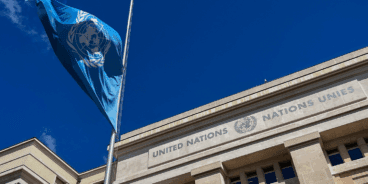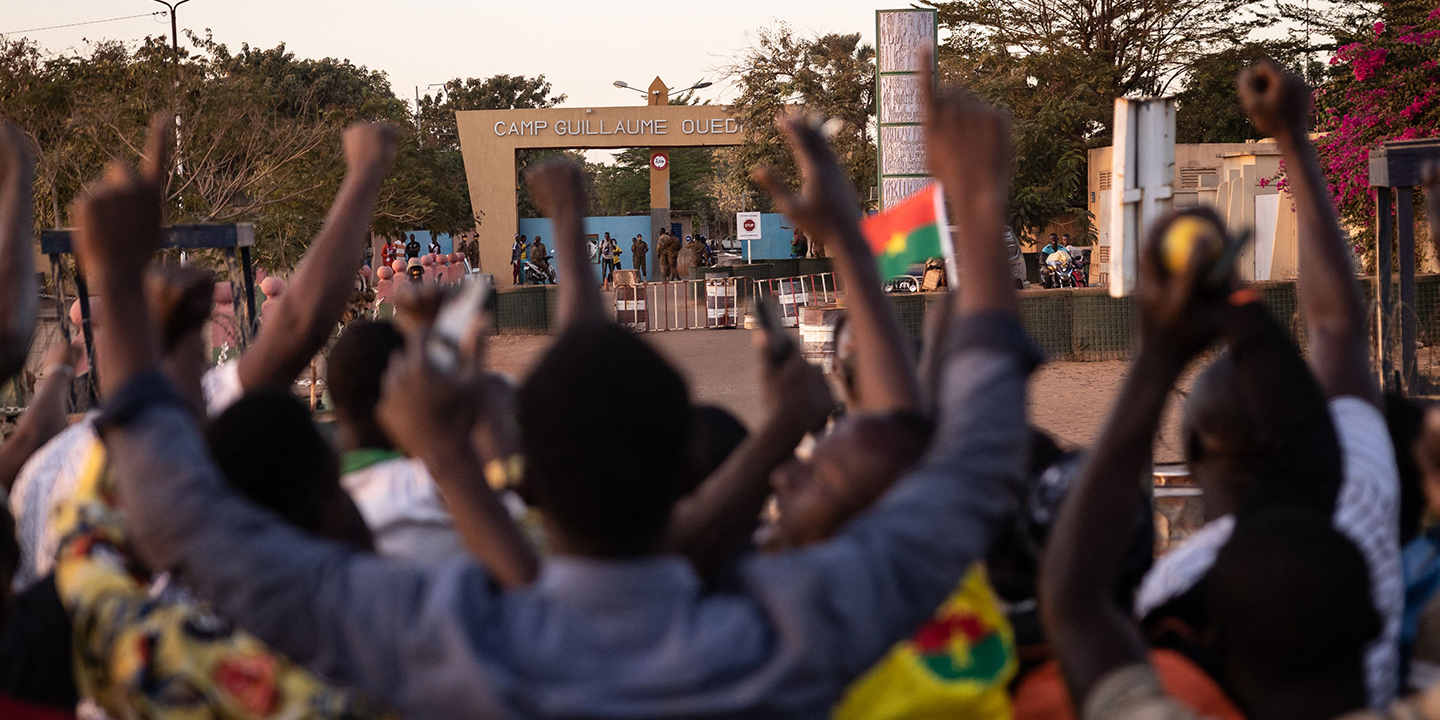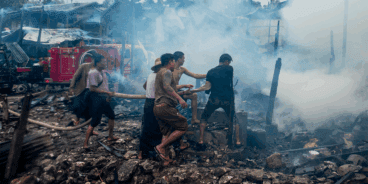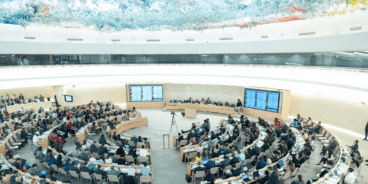

Atrocity Alert No. 285: Myanmar (Burma), Burkina Faso and the 40th Universal Periodic Review
Atrocity Alert is a weekly publication by the Global Centre for the Responsibility to Protect highlighting situations where populations are at risk of, or are enduring, mass atrocity crimes.
INTENSIFYING VIOLENCE IN MYANMAR BRINGS THE COUNTRY TO THE BRINK OF CIVIL WAR
More than 2,000 civilians in Shwebo Township, Sagaing Region, were displaced on 24 January when Myanmar’s (Burma) military – the Tatmadaw – torched their village in retaliation over an attack by a local People’s Defence Force (PDF). In Chin State, at least 3,000 people have been displaced in recent days as a result of clashes between local defense groups and the Tatmadaw. More than 30,000 villagers from Chin State have now fled violence in the region to seek safety in neighboring India. In addition, the military’s assault on Loikaw, Kayah State, by the Thai border, is ongoing and has contributed to the displacement of approximately half the region’s population.
Meanwhile, the Tatmadaw has also continued to perpetrate airstrikes throughout the country, particularly in Magway and Sagaing regions and Chin, Kachin, Shan, Kayah and Karen states, against PDFs and civilian areas, including refugee camps. These escalating attacks appear to be part of a widespread and systematic scorched earth campaign. The Karen National Union, the Karenni National Progressive Party and the Chin National Front recently called on the UN and the Association of Southeast Asian Nations (ASEAN) to declare a military no-fly zone due to the Tatmadaw’s increased use of airstrikes on civilian targets.
Amid this escalating violence, two of the world’s largest energy companies – TotalEnergies, the French energy conglomerate, and Chevron, a United States (US) multinational energy corporation – announced on 21 January that they will withdraw from Myanmar over worsening human rights abuses. This announcement came one day after TotalEnergies called for international sanctions on Myanmar’s oil and gas sectors. Oil and gas are Myanmar’s single largest source of foreign currency revenue, and limiting the Tatmadaw’s access to those funds is critical for hindering its ability to perpetrate atrocities. Liam Scott, Research Associate at the Global Centre for the Responsibility to Protect, said that, “governments have no excuse to avoid taking this concrete and impactful step towards limiting the Tatmadaw’s capacity to wage war on its own people. All UN member states – especially France, the US and members of the European Union and ASEAN – should now impose targeted sanctions on Myanmar’s oil and gas sectors.”
Nearly one year since the 1 February coup, the intensifying violence throughout Myanmar this past week has brought the country to the brink of civil war. Individual states, ASEAN and the international community must take the necessary steps to prevent further atrocities and a protracted conflict in Myanmar. States can and should do so by imposing arms embargoes on Myanmar to further limit the Tatmadaw’s capacity to commit atrocities. Targeted sanctions and arms embargoes are an effective and crucial way for states to uphold their responsibility to protect the people of Myanmar.
RISK TO CIVILIANS INCREASES FOLLOWING MILITARY COUP IN BURKINA FASO
On 24 January a group of mutinying soldiers announced on state television that they had seized control of Burkina Faso after detaining President Roch Marc Christian Kaboré, suspending the constitution and dissolving the government and national assembly. The announcement came two days after riot police clashed with anti-government protesters in the capital, Ouagadougou. The leaders of the coup, the Patriotic Movement for Preservation and Restoration, said they acted in response to the “exasperation of the people.”
Discontent and criticism from civilians and the military had been growing over President Kaboré’s inability to stem pervasive insecurity caused by the spread of Islamist armed groups and their increasing attacks. These grievances have fueled a wave of protests in recent months. Some troops were also frustrated due to the lack of resources they have been given to fight violent extremism.
While hundreds of people gathered in Ouagadougou to celebrate the coup, the situation has drawn condemnation, including from UN Secretary-General António Guterres, the Economic Community of West African States (ECOWAS) and the African Union, who fear military rule could further destabilize Burkina Faso and the Sahel region. ECOWAS will hold an extraordinary summit on the situation in Burkina Faso on Friday.
Burkina Faso has previously been known for peaceful coexistence between different religious, linguistic and ethnic groups, as well as a fragile stability until a popular uprising in 2014 that ousted longtime former President Blaise Compaoré, creating a power vacuum. In subsequent years, homegrown Islamist armed groups formed and regional factions of these groups also spread into Burkina Faso from neighboring Mali and Niger. During 2018 violence by Islamist armed groups worsened, with these groups increasingly targeting civilians and capturing towns and territory. According to Human Rights Watch, Islamist armed groups killed more than 350 civilians and kidnapped hundreds of others in Burkina Faso during 2021.
Since the beginning of the crisis, Burkinabé authorities have struggled to provide adequate protection to populations, and at times, military and police forces have perpetrated atrocities against civilians, including murder, rape and torture while fighting Islamist armed groups. For example, in November, Burkinabé troops allegedly extrajudicially killed 15 men from around Djigoué village, in the south-west region, and three men from Poikoro village, in the Cascades region. The escalating conflict has resulted in Burkina Faso becoming one of the fastest growing displacement and protection crises in the world, with at least 1.6 million people displaced.
Christine Caldera, Research Analyst at the Global Centre for the Responsibility to Protect, said that, “while the long-term impact of the military takeover in Burkina Faso remains unclear, the risks for civilians are heightened given the grave security threats and humanitarian crisis facing the country. As the situation remains volatile, it is more important than ever to ensure that the country’s human rights obligations are fully respected.”
UN REVIEWS HUMAN RIGHTS RECORDS OF SOUTH SUDAN, SUDAN, SYRIA AND VENEZUELA
The Universal Periodic Review (UPR) – a peer review process of every country’s human rights record – began on 24 January in Geneva under the auspices of the UN Human Rights Council (HRC). Among the 12 countries under review this session are South Sudan, Sudan, Syria and Venezuela, providing member states with an important opportunity to examine ongoing systematic violations and abuses of human rights, and offer recommendations to governments to better protect their populations, who are at risk of, or are facing, atrocity crimes.
Member states reviewed Syria on the first day of the UPR session, during which cross-regional delegations condemned ongoing war crimes and crimes against humanity. Syria’s review occurred against the backdrop of the conflict entering its eleventh year, with Syrian government forces continuing to carry out indiscriminate airstrikes, as well as commit murder, torture and sexual violence as a matter of state policy.
Yesterday member states took stock of Venezuela’s human rights record, which occurred amid ongoing government repression and persecution, and violations and abuses which may amount to possible crimes against humanity. Despite being a current member of the HRC, the Venezuelan government refuses to commit to genuine and system-wide human rights reform. The recommendations from the UPR will help outline necessary reform to address atrocity risk factors, which should guide member states’ decisions on long-term engagement with Venezuela.
The UPR of South Sudan – which is scheduled to take place on 31 January – is a vital opportunity to insist the government take steps to ensure the full implementation of the 2018 peace agreement and address the underlying causes of intensifying inter-communal and localized violence. Member states should also reiterate the recommendations provided by the HRC-mandated Commission on Human Rights in South Sudan, which previously noted that many structural factors that facilitated the commission of atrocity crimes in the past, remain present today.
Sudan’s UPR – which is set for 1 February – will be occurring amid increased political violence following the 25 October military coup. Since then, pro-democracy movements continue to protest and demand a genuine civilian-led political transition. Member states should ensure that the UPR process does not legitimize the unconstitutional actions of the military, as well as address the deteriorating human rights situation in Sudan. Additionally, intensifying clashes in Darfur demonstrate the need for disarmament of ethnic militias and other armed groups, justice for past atrocity crimes and providing effective protection to all vulnerable populations.
Savita Pawnday, Executive Director of the Global Centre for the Responsibility Protect, said that, “as the UPR is underway, states should utilize the process to ask governments about measures they are willing to take to protect their populations, how these will be implemented through system-wide, institutional reform, and who will be held accountable if they continue to fail to do so.”
Related Content


Atrocity Alert No. 449: Myanmar (Burma), Ukraine and North Korea
